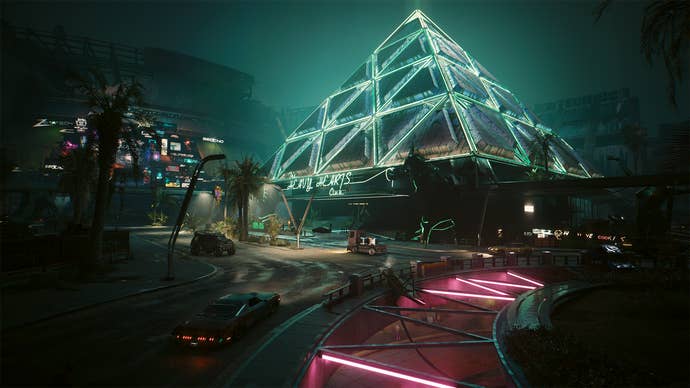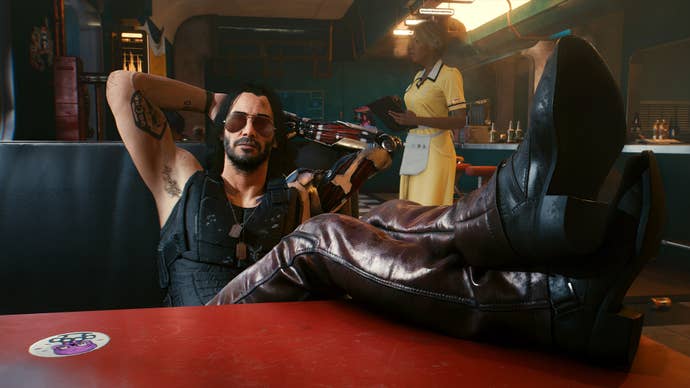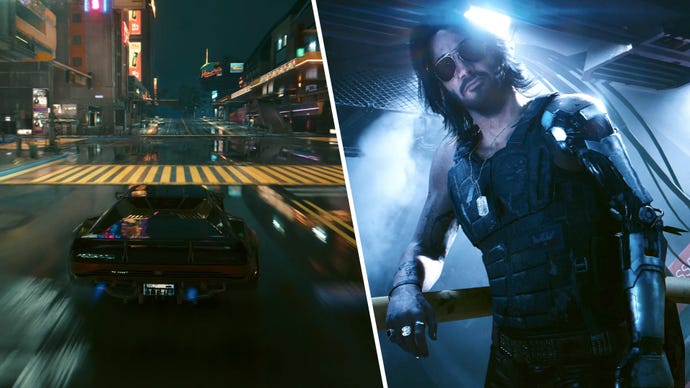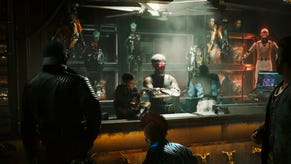How Cyberpunk 2077 cheated the past to forge the future
Patch 2.0 and Phantom Liberty finally fulfil the promise that inspired eight million pre-orders.
A sense of Deja Vu swept the gaming industry this week as we once again heard that familiar refrain about the latest update making Cyberpunk 2077 properly good now. No really, they’ve done it this time. It’s definitely now the game that they promised back in 2020, or 2018, or 2013, depending on when you start counting. Patch 1.2 really fixed everything. Except until patch 1.6, which fixed everything. Now, though, patch 2.0 has fixed everything. If you get Phantom Liberty, which really fixes everything.
This time, it does actually appear that Cyberpunk 2077 has properly arrived. The 2.0 update re-jigs the game’s RPG systems so thoroughly that it’s almost a different RPG entirely. Less baffling, more fun, in a move that echoes the similar revamp that fixed all of The Witcher 3’s more annoying bits a couple of years after release. And the new expansion, Phantom Liberty, represents a studio at the top of their game that has been let loose to fire on all cylinders (and other cliches).
As Alex and I discuss in the video below, in terms of its visual spectacle and hit-after-hit quest design, Phantom Liberty in combination with patch 2.0 and the bleeding-edge graphics tech afforded by Nvidia’s 4000 series GPUs on the PC really gets close to the ideal of Cyberpunk 2077 that eight million players thought they were pre-ordering back in 2020.
How many of those eight million players bought it on PS4 or the base Xbox One? We don’t know the exact numbers, but considering that Cyberpunk’s pre-orders went live weeks before the current generation consoles even started being shipped to retailers, it’s fair to assume a high percentage. And with the number of people who bought it upon release, who didn’t have a PS5, Series X, or PC worth more than a used car, who knows how many people ultimately purchased the game intending to play it on systems that frankly couldn’t run it acceptably. Millions, no doubt. A very high number of sales. A lot of revenue.
However good Cyberpunk now is – and it is astoundingly good, to be clear – the current version of the game which many are hailing as the game having now properly arrived, with some going as far to suggest that 2077 has essentially been in early access until this point, was at least in part funded on the backs of people purchasing a game that didn’t work properly on their hardware. Hardware which it was sold and labelled for, despite the protestations of people who insisted at the time that trying to play it on the base PS4 was some kind of user error.
Cyberpunk 2.0 exists because Cyberpunk 1.0 was missold as a last gen game. This is not something which any of us should forget.

I don’t think for a second that the creative team at CDPR wanted it to be this way. I don’t think anyone in their right mind thinks it’s acceptable to rush a product out before its ready, and to an install base that isn’t ready to receive it. I’ve had the pleasure of meeting a few CDPR devs back during the press cycle for The Witcher 3: Blood and Wine, and like the vast majority of game developers, they are passionate people who simply want to make the best games they can make. Like many of us, they are under a lot of pressure to hit certain targets and milestones that often don’t have anything to do with producing quality work.
But someone along that chain is responsible for the debacle that they have spent three years fixing, clawing back all that goodwill that the studio had earned from their stewardship of The Witcher, much of which will never be reclaimed. They probably made a fateful decision in the belief that it would deliver value to shareholders. A system which encourages immoral profiteering at the expense of a firm or product’s reputation is a broken system that fundamentally only serves to propagate itself, not the needs of the people that live and work to sustain it. The parallels with Cyberpunk’s grotesque projection unchecked capitalism need not be spelt out.

Cyberpunk 2077 is currently the most advanced graphical showcase ever made. It sits on the absolute bleeding edge of technology that will one day, probably by the time the next console generation rolls around, be fundamental to how real time 3D rendering works. We’re heading toward a future where the image that gets rendered natively will merely be a blueprint for reconstructive processes to weave their magic from. This will allow deep, game-changing raytracing to become a standard feature of video games in the same way that ultra-fast storage is now starting to change the fundamentals of game design. And it will run on energy-efficient hardware that won’t, for its time, be considered particularly high-performance. Cyberpunk offers a glimpse of that future. It’s exciting stuff for any sort of gamer, from the hardcore tech nerds to anyone who sees themselves buying a Nintendo Switch 2 in the coming years.
But that progress came at a cost, and the consumer bore the brunt of it. The next time a game goes into a protracted hype-cycle with a mind of its own, I hope people will remember the state that Cyberpunk 2077 launched in and, as they say where I grew up, keep the heid. Because it should be a learning experience for all of us.
Cyberpunk 2077 version 2.0 is available now as a free update for current gen consoles and PC. The Phantom Liberty expansion retails for £24.99 on most storefronts.









